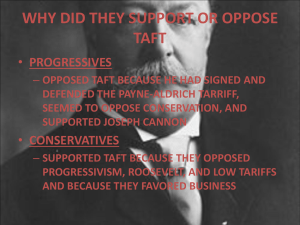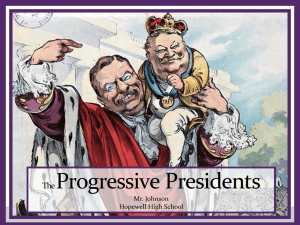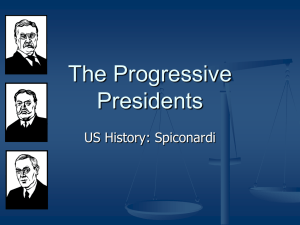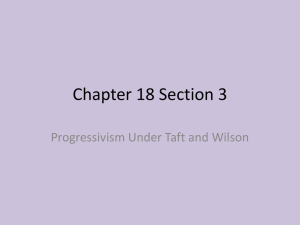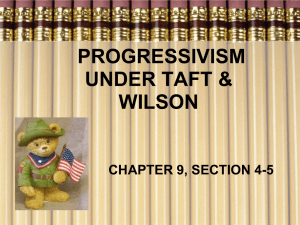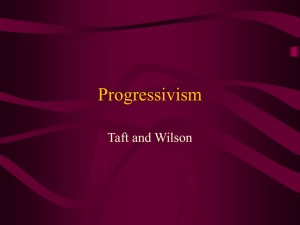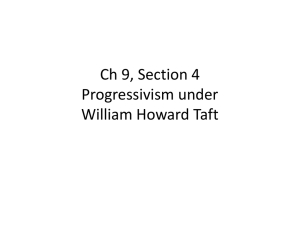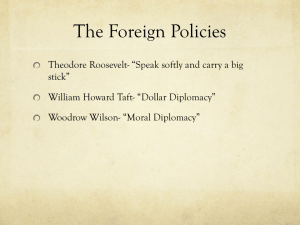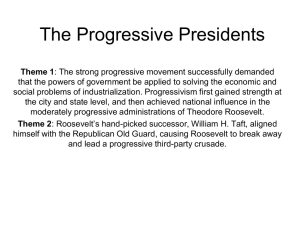Progressivism Under Taft
advertisement
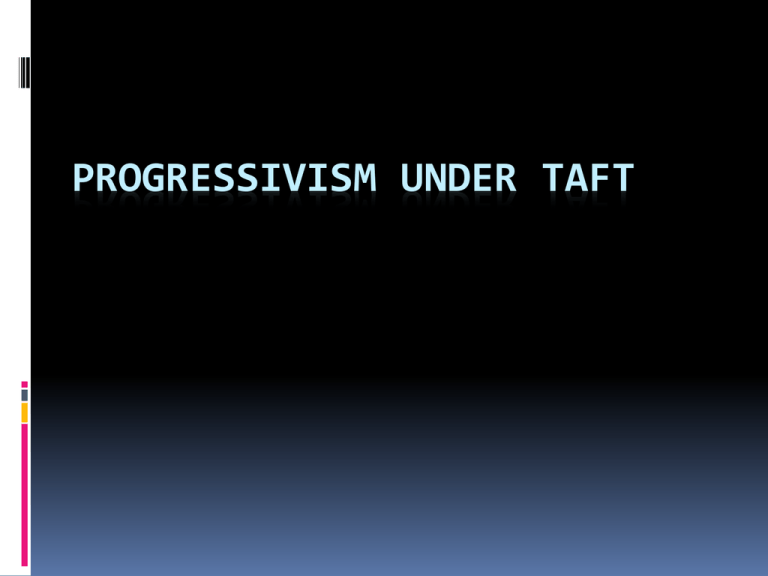
PROGRESSIVISM UNDER TAFT When Roosevelt won election in 1904 he pledge not to run for reelection in 1908 He hand picked his secretary of war William Howard Taft to carry out his policies Three times democrats nominated William Jennings Bryan who called for federal income tax, a lower tariff, new antitrust laws but the people voted for Taft Taft received low credit for accomplishments as he pursued a cautiously progressive agenda Taft busted 90 trusts in a four year term beating Roosevelt’s 44 in seven and a half years in office Campaigned on a platform lowering tariffs, the house duly passed the Payne Bill which would lower rates in many manufactured goods but conservative republicans eliminated most of the cuts Taft signed the Payne -Aldrich Tariff Caused problems by clumsily defending it in front of hostile farmers in Winona, Minnesota Said best bill republican party passed, tried to repair damages only making it worse when he read a speech quickly between two railroad stations without bothering to reread it Next angered conservationists by appointing as secretary of the interior Richard A. Ballinger who was a wealthy Seattle lawyer who didn’t like the conservationists controlling western lands Removed 1million acres of forests and mining lands from reserved lists and approved sale to Seattle businesses of several coal rich lands in Alaska In January 1910 Pinchot added his voice and accused Ballinger of letting commercial interest exploit natural resources that belonged to the public Taft fired Pinchot from the US forest service Republican conservatives and progressives split over Taft’s support of political boss, Joseph Cannon speaker of the house Joseph Cannon not only disregarded seniority in filling the committee slots but also anointed himself as head of the committee on rules, which decided the bills congress would consider which caused the house to often ignore or weaken progressive bills Republicans lost election, democrats gained control of the house for the first time in 18 years In 1912 Roosevelt decided to run for a third term as president At republican convention in June 1912 Taft supporters refused to see Roosevelt’s delegates and renominated Taft Roosevelt supporters called a convention in august where they formed a new third party the progressive party Became known as the “Bull Moose Party” After Roosevelt boasted that he was as strong as a bull moose They called for a direct election of senators and the adoption in all states of the initiative, referendum and recall Also advocated women’s suffrage, national workmen’s compensation an eight hour work day, minimum wage for women, a federal law against child labor, and a federal trade commission to regulate business Split in republican ranks handed democrats their first real chance at the white house since election of Grover Cleveland in 1892 In the 1912 president election democrats put forward their candidate a reform governor of New Jersey named Woodrow Wilson Wilson endorsed a progressive platform called New Freedom that demanded even stronger antitrust legislature, banking reform, and reduced tariffs During election of 1912 it offered voters several choices Wilson’s New Freedom, Taft’s Conservatism, Roosevelt’s Progressivism or Socialist Party policies of Eugene V. Debs Roosevelt supported government action to supervise big business but didn’t appose all big business monopolies Wilson supported small business and free market competition and characterized all big business monopolies as evil Debs pulled over 900,000 popular votes(6%) went farther then Wilson and Roosevelt and called for and end to capitalism and wanted to use the government to regulate business and bust trusts but also to distribute national wealth more equally among the people Wilson captured only 42% of popular vote he won electoral victory and democratic majority in congress Roosevelt defeated Taft in popular and electoral but reform claimed real victory with 75% of the vote going to reform candidates Wilson, Roosevelt, and Debs In victory Wilson claimed a mandate to break up trusts and expand government role in social reform
